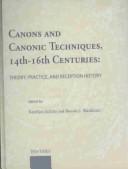| Listing 1 - 4 of 4 |
Sort by
|

ISBN: 9789042916814 9042916818 Year: 2007 Volume: 1 Publisher: Leuven Peeters
Abstract | Keywords | Export | Availability | Bookmark
 Loading...
Loading...Choose an application
- Reference Manager
- EndNote
- RefWorks (Direct export to RefWorks)
Although canons pervade music of the Middle Ages and the Renaissance, they have not received proportionate attention in the musicological literature. The contributions in this book shed light on canons and canonic techniques from a wide range of perspectives, such as music theory and analysis, compositional and performance practice, palaeography and notation, as well as listening expectations and strategies. Especially in the case of riddle canons, insights from other disciplines such as literature, theology, iconography, emblematics, and philosophy have proved crucial for a better understanding and interpretation of how such pieces were created. The essays extend from the early period of canonic writing to the seventeenth century, ending with three contributions concerned with the reception history of medieval and Renaissance canons in music and writings on music from the Age of Enlightenment to the present
Music --- canons --- muziekgeschiedenis --- anno 1400-1499 --- anno 1300-1399 --- anno 1500-1599 --- Canon (Forme musicale) --- Canon (Musical form) --- Canon (Muzikale vorm) --- 091:78 --- 091 <063> --- 784.18 --- Handschriften i.v.m. muziek --- Handschriftenkunde. Handschriftencatalogi--Congressen --- Arts Music Musical forms --- Conferences - Meetings --- 091 <063> Handschriftenkunde. Handschriftencatalogi--Congressen --- 091:78 Handschriften i.v.m. muziek --- Congresses. --- Congresses --- Canons, fugues, etc. --- Counterpoint --- Musical form --- History and criticism
Book
ISBN: 9780199998098 9780199998104 9780199394371 0199998108 0199394377 0199998094 0199395187 Year: 2014 Publisher: New York, NY
Abstract | Keywords | Export | Availability | Bookmark
 Loading...
Loading...Choose an application
- Reference Manager
- EndNote
- RefWorks (Direct export to RefWorks)
This title uses the reception of the Germanic musical heritage to chart the changing landscape of musical culture in the German Democratic Republic. Author Elaine Kelly demonstrates the nuances of musical thought in the state, revealing a model of societal ascent and decline that has implications that reach far beyond studies of the GDR itself.
Canon (Musical form) --- Music --- Canon (Musique) --- Musique --- History and criticism --- Political aspects --- History --- Histoire et critique --- Aspect politique --- Histoire --- Art music --- Art music, Western --- Classical music --- Musical compositions --- Musical works --- Serious music --- Western art music --- Western music (Western countries) --- Canons, fugues, etc. --- Counterpoint --- Musical form --- History and criticism.
Book
ISBN: 9789052014579 9052014574 Year: 2008 Volume: 1 Publisher: Bruxelles : P.I.E. Peter Lang,
Abstract | Keywords | Export | Availability | Bookmark
 Loading...
Loading...Choose an application
- Reference Manager
- EndNote
- RefWorks (Direct export to RefWorks)
Canon (Musical form) --- Hermetism in music --- Music theory --- Composers --- Church music --- Canon (Musique) --- Hermétisme dans la musique --- Théorie musicale --- Compositeurs --- Musique d'église --- History --- Histoire --- Music --- History and criticism --- 780.903 --- Arts Music 1450 - 1900 --- Hermétisme dans la musique --- Théorie musicale --- Musique d'église --- Italy --- 17th century --- Composition (Music) --- 78.25 --- Music - Italy - 17th century - History and criticism --- Canons --- Muziekpuzzels --- Muzieknotatie --- Italië --- 17e eeuw
Book
ISBN: 9781580465120 1580465129 9781782045410 1782045414 Year: 2015 Publisher: Rochester, NY : University of Rochester Press,
Abstract | Keywords | Export | Availability | Bookmark
 Loading...
Loading...Choose an application
- Reference Manager
- EndNote
- RefWorks (Direct export to RefWorks)
By the 1840s Joseph Haydn, who died in 1809 as the most celebrated composer of his generation, had degenerated into the bewigged "Papa Haydn," a shallow placeholder in music history who merely invented the forms used by Beethoven. In a remarkable reversal, Haydn swiftly regained his former stature within the opening decades of the twentieth century. Reviving Haydn: New Appreciations in the Twentieth Century examines both the decline and the subsequent resurgence of Haydn's reputation in an effort to better understand the forces that shape critical reception on a broad scale. Nosingle person or event marked the turning point for Haydn's reputation. Instead a broad resurgence reshaped opinion in Europe and the United States in short order. The Haydn revival engaged many of the music world's leading figures -- composers (Vincent d'Indy and Arnold Schoenberg), conductors (Arturo Toscanini), performers (Wanda Landowska), critics (Lawrence Gilman), and scholars (Heinrich Schenker and Donald Tovey) -- each of whom valued Haydn's music for specific reasons and used it to advance particular goals. Yet each advocated for a rehearing and rereading of the composer's works, calling for a new appreciation of Haydn's music. Bryan Proksch is assistant professor of music history at Lamar University in Beaumont, Texas, where he specializes in the music of the late eighteenth century.
Music --- Composers --- Musical canon --- Musique --- Compositeurs --- Chefs-d'oeuvre (Musique) --- History --- Histoire --- Haydn, Joseph, --- Criticism and interpretation --- Influences --- Appreciation --- Influences. --- Appreciation. --- Canon, Musical --- Canon (Music) --- Musical criticism --- Haydn, Joseph --- Haydn, Franz Joseph --- Gaĭdn, Ĭ., --- Gaĭdn, Ĭosif, --- Gaĭdn, Ĭozef, --- Haiden, Josip, --- Haidnas, J., --- Haidun, --- Hayden, Joseph, --- Haydn, --- Haydn, F. J. --- Haydn, Franz Josef, --- Haydn, Franz Joseph, --- Haydn, Giuseppe, --- Haydn, Ios. --- Haydn, J. --- Haydn, Jos. --- Haydn, Josef, --- Heyden, Joseph, --- Khaĭdn, Ĭozef, --- היידן, י., --- Changing Reputation. --- Composer Resurgence. --- Haydn. --- Music History. --- Musical Revival. --- Twentieth Century.
| Listing 1 - 4 of 4 |
Sort by
|

 Search
Search Feedback
Feedback About UniCat
About UniCat  Help
Help News
News